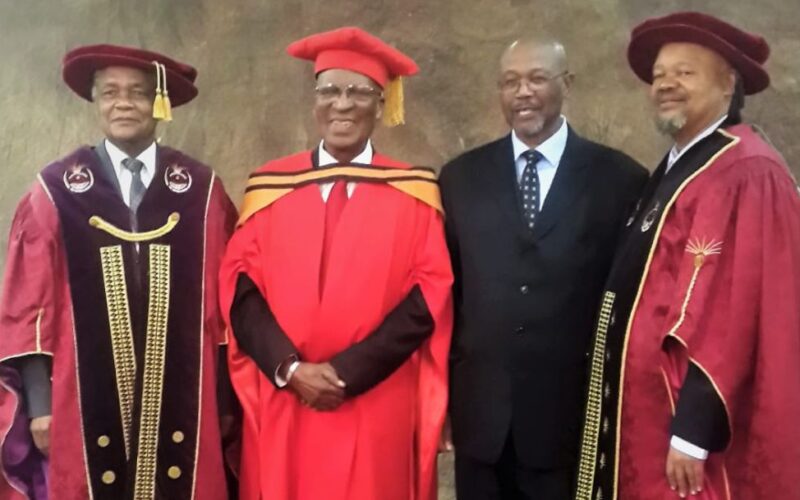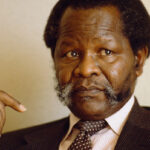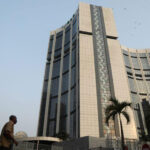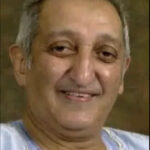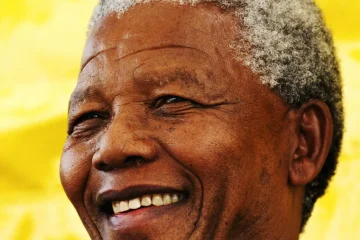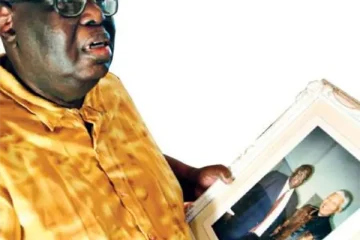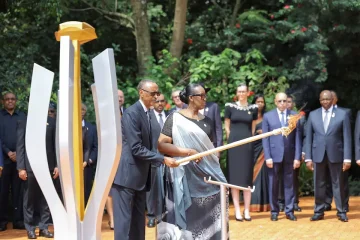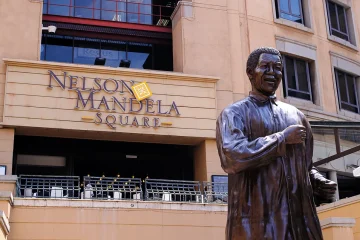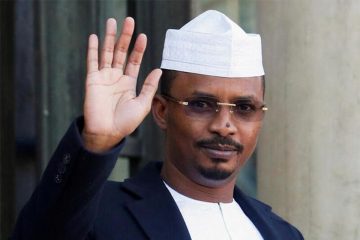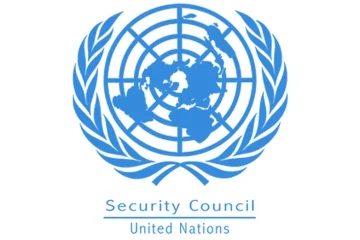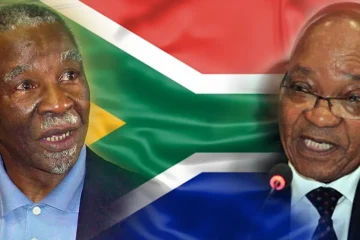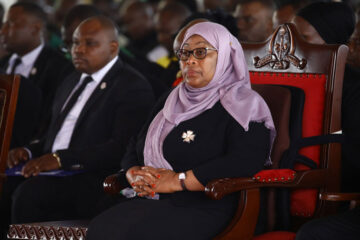KHULU MBATHA
FLASHBACK: We met acting president-general of the ANC, Oliver R Tambo, for the first time in Dar-es-Salaam, Tanzania in 1976. We, fresh from South Africa, still carrying scratches and cuts on our bodies all sustained during the stone-throwing confrontations with policemen and armed SADF personnel.
Seating underneath the shade of a big Kigelia, the sausage tree, the new arrivals were making a meal out of Tambo’s presence and bombarding him with so many questions about the struggle.
What have you been doing in the past [since the banning of the organisation] 16 years? Where was the ANC when the Boers were shooting and killing us? What are you doing in Tanzania when the struggle was being fought back at home? We were actually accusing him and the rest of the Mgwenyas, of neglect of duties.
Though it was in the afternoon, the heat was still strong as Tambo sat in the middle of an arch, emotionless and looking at these actors throwing blow after blow at him. Looking up into the empty sky and for a moment looking a bit lost and with a sharp move of his head, his face occasionally turning to us with flashing eyes. Tambo was in deep thoughts.
This went on for almost an hour before he responded. He started by saluting all those who spoke, as though he agreed with everything that was directed to him and his comrades in the leadership.
Tambo was a teacher by profession and over the years he had mastered the art of engaging with people in various situations. The gravity of the then prevailing atmosphere was matched by his cool, calm and collected demeanour.
By the end of his response, once he had finished untangling the complex conditions existing both inside South Africa and on the international platform and winning the body and soul of everyone present, silence prevailed.
The sudden departure of ‘the backroom boy’, Bab’ uMlangeni was the cause I turned back to this memory lane. One may perhaps say that his death should have been expected considering his age and the number of “ICU detentions” he has had. But that’s the nature of death, always shocking.
But then again, this is not just an ordinary death, it is also political and ethical. Just think of what Bab’ uMlangeni, the last man who was in the treason trial, said in one of the last interviews that he had before his departure.
A journalist asked him if he was happy with the way the country is today. His response was, “Happy, you must be joking! I can’t be happy my dear…” He then explained the appalling state of affairs in the ANC.
What report is ‘the backroom boy’ taking with him up there? Is he going to tell Tambo, Mandela, Sisulu and the rest that the organisation is in a better space now?
Lest we forget!!!
Who were these brave men in the Rivonia trial? When the trial came to the end, what made these men so composed in the face of death with only one step left to the gallows?
Why did OR Tambo not waiver? He could have easily taken over the leadership of the ANC and forgot about these men.
Well, I guess there is more than one answer to these many questions? For the record, permit me, to state the following:
There were men and women born in the 19th century who, in the first quarter of the 20th century, gave birth to boys that were robbed at a tender age of fatherhood and in some cases just parenthood – Walter Sisulu born 1912, Oliver Tambo in 1917, Nelson Mandela in 1918, Andrew Mlangeni in 1925 and Ahmed Kathrada in 1929, to mention just a few.
Some of these boys, following the death of their fathers, were forced to leave their birthplaces in the rural parts of the country, and landed in the City of Gold, Johannesburg.
As young men, they grew up rattling and dominating the politics of the 1950s. At the closure of the century in which they were born, most of them at ages between the late sixties and early eighties, they together with the masses of our people, delivered freedom in 1994.
Like their fathers, as history repeated itself, death took them away in the first quarter of another century – the 21st century. With the exception of Elias Motsoaledi (9 May 1994), Govan Mbeki departed on 30 August 2001, Walter Sisulu on 5 May 2003, Wilton Mkwayi on 24 July 2004, Raymond Mhlaba on 20 February 2005, Nelson Mandela on 5 December 2013, Dennis Goldberg on 29 April 2020 and now Andrew Mlangeni on 21 July 2020.

Left to Right:
Standing: Ntsiki Sisulu, Unknown man and Sello Mlangeni
Seated below: Andrew Mlangeni and Dr khulu Mbatha
As I reflect on their sacrifices and contributions to our freedom, I want to pause and mirror the realities of the world they traversed.
I begin with Andrew Moeti Mokete Mlangeni who was born on a farm next to Bethlehem in 1925 and had a twin sister named Emma. On the day of his birth there was a church’s feast at his home and many guests – hence the names Mokete (feast) and Moeti (visitor).
The Mlangenis were victims of the 1913 Natives Land Act. They had lost their land to the Boers, who converted all the land in the area into farms. As a result his father, Matia, married to Aletta, was a farm labourer cultivating maize meal, oftentimes exposed to dusty conditions.
A year after Mlangeni’s birth, his father had moved from one farm Matjeteng to another called Matoding. The Boers renamed the area Maynhartfontein and owned the land and the people living on it.
Matia and Aletta had ten children, including two sets of twins, with Emma being regarded as the 8th (the eldest twin) and Andrew 9th.
“The usually busy and noisy afternoon time of the late afternoon fell silent. The children, by now curious, began to play quietly, trying to catch what was said inside. Soon, they heard their mother sobbing, and the low voice of Old Lady Mosia trying to calm her. Then Aletta’s sobbing became a loud cry and all the playing outside suddenly stopped, the children looking at each other in wonder…
“As the older children cried, some shouting ‘papa, papa’, the younger ones, including six-year-old Andrew, realised that something terrible had happened to their father. This was soon confirmed by Old Lady Mosia who came to the hut and told them that their father Matia was no more… In fact, he had been coughing for so long that people had got used to it.”
The death of Bab’uMlangeni’s father saw everything crashing for the six-year-old. This was a very cruel episode in his life. After about three years or so, with a terrible drought in the area and his mother not coping with the children, it was time to move away from the farm. They were also not helpful to the farm owner.
Thanks to the elder brothers who found work in Bethlehem, the family moved there. Andrew saw a school for the first time. Soon thereafter the brothers found work in the City of Gold.
The brothers moved one by one, and one stayed in George Goch and the other in Prospect Township. His mother followed with the children. And so young Mlangeni moved to Johannesburg.

Left to Right: Andrew Mlangeni, Gugu Mbatha and Dr Khulu Mbatha.
Rolihlahla Nelson Mandela was born in Mvezo and trekked to Qunu with his mother when his father was stripped of his responsibilities as a chief by a white magistrate. “Apart from life, a strong constitution, and an abiding connection to the Thembu royal house, the only thing my father bestowed upon me at birth was a name, Rolihlahla…
“One night, when I was nine years old, I was aware of a commotion in the household. My father, who took turns visiting his wives and usually came to us for perhaps one week a month, had arrived. But it was not at his accustomed time, for he was not scheduled to be with us for another few days. I found him in my mother’s hut, lying on his back on the floor, in the midst of what seemed like an endless fit of coughing. Even to my young eyes, it was clear that my father was not long for this world. He was ill with some type of lung disease, but it was not diagnosed, as my father had never visited a doctor. He remained in the hut for several days without moving or speaking, and then one night he took a turn for the worse. My mother and my father’s youngest wife, Nodayimani, who had come to stay with us, were looking after him, and late that night he called for Nodayimani. “Bring me my tobacco,” he told her. My mother and Nodayimani conferred and decided that it was unwise that he has tobacco in his current state. But he persisted in calling for it, and eventually, Nodayimani filled his pipe, lit it, and then handed it to him. My father smoked and became calm. He continued smoking for perhaps an hour, and then, his pipe still lit, he died…
“My father’s passing changed my whole life in a way that I did not suspect at the time. After a brief period of mourning, my mother informed me that I would be leaving Qunu. I did not ask her why, or where I was going.
“I packed the few things that I possessed, and early one morning we set out on a journey westward to my new residence…
“We traveled by foot and in silence until the sun was sinking slowly toward the horizon… It was an exhausting journey, along rocky dirt roads, up and down hills, past numerous villages, but we did not pause. Late in the afternoon, at the bottom of a shallow valley surrounded by trees, we came upon a village at the center of which was a large and gracious home that so far exceeded anything that I had ever seen that all I could do was marvel at it…
“This was the Great Place, Mqhekezweni, the provisional capital of Thembuland, the royal residence of Chief Jongintaba Dalindyebo, acting regent of the Thembu people.”
From Mqhekezweni, after passing Standard V it was to Clarkerbury Boarding Institute in Engcobo. Then came Healdtown in Fort Beaufort, which was followed by Fort Hare in Alice.
Two unrelated events triggered his great escape. Firstly, it was a possible expulsion from Fort Hare after he resigned from the SRC. Secondly, he faced a forced marriage by the regent to someone he did not love. The fatherless young Madiba ran away for the City of Gold in search of a better future.

Andrew Mlangeni and Dr Khulu Mbatha.
Walter Max Ulyate Sisulu’s father had no role in his upbringing. He was among the firsts of the Rivonia trialists to arrive in the City of Gold. He was streetwise and after a variety of manual jobs, he settled and owned the only black estate agency in the country then.
It was in his offices when they first met with Mandela. As Mandela put it, “Garlick and I sat in the estate agent’s waiting room while a pretty African receptionist announced our presence to her boss in the inner office… She soon ushered us into the inner office, where I was introduced to a man who looked to be in his late twenties, with an intelligent and kindly face, light in complexion, and dressed in a double-breasted suit.
“Despite his youth, he seemed to me an experienced man of the world. He was from the Transkei, but spoke English with a rapid urban fluency. To judge from his well-populated waiting room and his desk piled high with papers, he was a busy and successful man. But he did not rush us and seemed genuinely interested in our errand. His name was Walter Sisulu.”
Ahmed Kathrada, who was born on 21st August 1929 in Schweizer-Reneke, says, “But, by the time I reached school-going age, I was forced to come face to face with an animal called ‘segregation’, as apartheid was euphemistically known before the National Party came to power in 1948″.
There were schools for whites and Africans in the town but none for Indians. Shortly after his eighth birthday, Kathrada was “packed off to a distant Johannesburg to stay with a paternal aunt in Fordsburg, and attend the Indian school there…
“I suppose that was the first politically flavoured event that affected me directly and recognisably … I could not understand the strange adult logic that required me to be wrenched from my home and friends and sent to school in far-off Johannesburg.”
His father got ill and Kathrada tells us that, “Five years after being uprooted from Schweizer-Reneke, my father died. For that crucial period of my life, I had been outside his sphere of influence, and as a result, I always felt that I never really knew him.”
He adds that, “…I am very ashamed to say I know very little about his early life, or my mother’s either – one of the unfortunate consequences of being sent away to school at the age of eight, and never really going home again, except for holidays.”
I end with the life story of Kaizana Oliver Reginald Tambo. Having excelled in his primary school in Bizana, Pondoland, and through the recommendation of the missionaries running his school, he was sent to the renowned St. Peter`s in Rosettenville, Johannesburg for his JC and high school education.
After arriving in Johannesburg, “We were beginning to look forward to our Christmas holidays… when one heart-rending afternoon in late November I received a short telegram informing me that my mother had died in September. No further details were given…”
Tambo had no other correspondence or explanation and was left in grief alone. He only returned home for holidays the following year in June and found that more relatives had passed away. After leaving for school again “…in September of that year, another devastating telegram arrived, Manchi [his father] had died.”

Left to Right: Former Unisa Chancellor Judge Bernard Ngoepe, Andrew Mlangeni, Dr Khulu Mbatha and Unisa Principal and Vice-Chancellor Prof Mandla Makhanya.
He says, “I had noticed during the June holidays that my father was very ill. He was receiving no medical treatment and yet was overworking himself. And so he passed on.”
Tambo did well at St. Peter’s and went on to Fort Hare. He was doing well also at Fort Hare when he was expelled. He was fortunate to be hired at the same school he attended in Johannesburg.
These are the true-life stories of the Rivonia trialists and that of OR Tambo who fought for many years for their release from Robben Island. Coming from different parts of the country and landing in the City of Gold, they met, sometimes through coincidental encounters and developed long-lasting friendships and bonds.
They were core founders of the Youth League. They went on to revolutionise the ANC and at the end formed uMkhonto We Sizwe. They sacrificed their own freedoms and were also prepared to hang so that we can enjoy the fruits of a free South Africa.
And so, Bab’ uMlangeni’s demise closes a chapter of the valiant Rivonia trialists as well as the leadership of that era! The only difference this time is that they all left older sons and daughters than what they had experienced in their lives.
The Greeks regarded the Seven Wonders of the ancient world as the themata, ‘things to be seen’ or the ‘must-sees’. Of those original seven wonders, only the Great Pyramid in Egypt exists today.
For the sake of history, let us make the Rivonia trial the Great Pyramid of our past history. Let us honour and celebrate their heroism! Let us emulate their bravery with greater vigour!
This we do, knowing very well that our freedom is not complete. There are many souls that still go to bed hungry and wish this freedom was also real for them.
References:
The Backroom Boy: Andrew Malengeni’s Story, by Mandla Mathebula
Long Walk to Freedom, by Nelson Mandela
Ahmed Kathrada Memoirs, by Ahmed Kathrada
Oliver Tambo: Beyond the Ngele Mountains, by Luli Callinicos
ADVERTISEMENT

